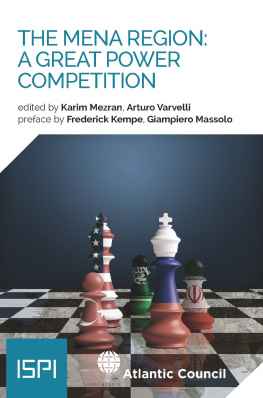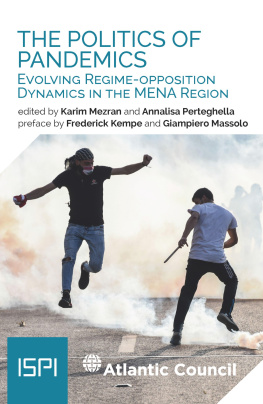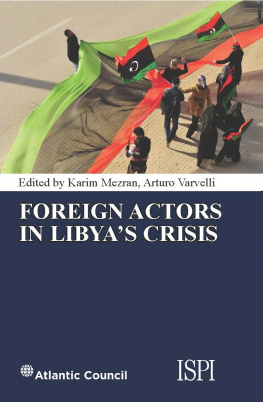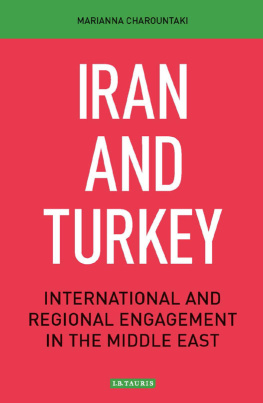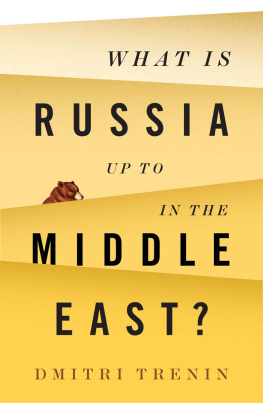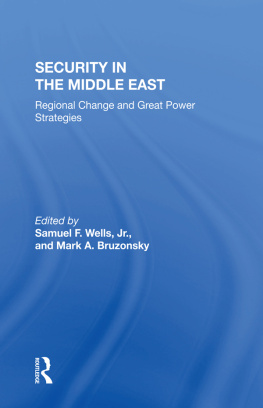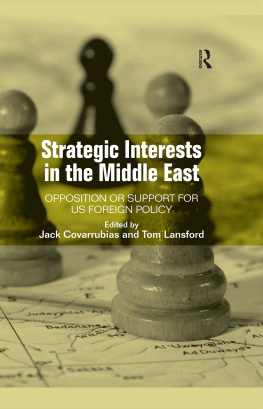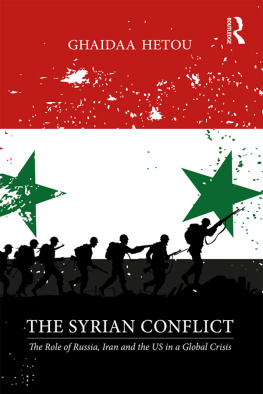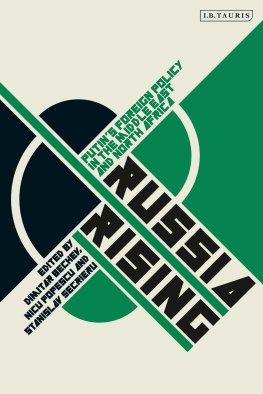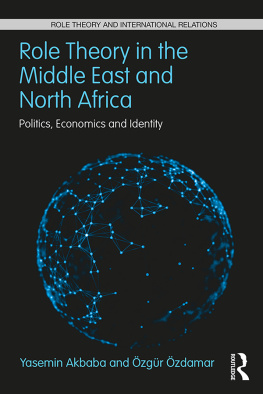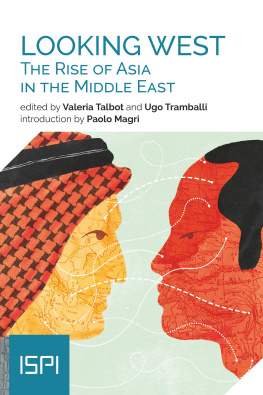2019 Ledizioni LediPublishing
Via Alamanni, 11 20141 Milano Italy
www.ledizioni.it
The MENA Region: A Great Power Competition
Edited by Karim Mezran and Arturo Varvelli
First edition: October 2019
The opinions expressed herein are strictly personal and do not necessarily reflect the position of ISPI.
This report is written and published in accordance with the Atlantic Council Policy on Intellectual Independence. The author is solely responsible for its analysis and recommendations. The Atlantic Council and its donors do not determine, nor do they necessarily endorse or advocate for, any of this reports conclusions.
To cite this report: Karim Mezran and Arturo Varvelli (eds.), The MENA Region: A Great Power Competition , ISPI and Atlantic Council, 2019.
https://www.ispionline.it/
http://www.atlanticcouncil.org/
Print ISBN 9788855260718
ePub ISBN 9788855260725
Pdf ISBN 9788855260732
DOI 10.14672/55260718
ISPI. Via Clerici, 5
20121, Milan
www.ispionline.it
Catalogue and reprints information: www.ledizioni.it
The Atlantic Council is a nonpartisan organization that promotes constructive US leadership and engagement in international affairs based on the central role of the Atlantic community in meeting todays global challenges.
The Atlantic Councils Rafik Hariri Center for the Middle East studies political and economic dynamics in the Middle East and recommends US, European, and regional policies to encourage effective governance, political legitimacy, and stability.
Preface
Frederick Kempe, Giampiero Massolo
Over the last few years, a crisis of legitimacy has beset the liberal orientation of the post-bipolar world order, which has been reflected in the strain on the multilateral fabric of international coexistence, the functioning of international organizations, and even the institutions of individual states. Most recently, in particular, the signs of disintegration of the international order have multiplied. A sense of global withdrawal of the United States has contributed to the weakening of the international order created at the end of World War II also and definitively consolidated at the end of the Cold War. Furthermore, the growing power of China and the renewed assertiveness of Russia seem to be a prelude to a new phase of depreciation of Western impact on the rest of the world, if not the opening of a great competition for the redistribution of power and international status.
In the context of this global reassessment, the configuration of regional orders has come into question, illustrated by the extreme case of the current collapse of the Middle Eastern order. Such a phenomenon has been ongoing for several years, and has recently accelerated. This was particularly evident in the period after the uprisings that erupted in the Middle East and North Africa (MENA) in 2011, when the United States signaled its choice to rebalance resources and commitments abroad and away from the region. This choice shifted the regional balance of power and ultimately challenged the United States effectiveness as the external provider of security in the area, leading to a power vacuum that other players have endeavored to fill. On the one hand, the United States choice has allowed for the ascent of regional actors: Saudi Arabia and the Gulf monarchies, Iran, Turkey, and Israel have each gained an increasingly prominent position on the Middle Eastern stage and become determinant in the fate of multiple MENA crises. As a result, competition over the MENA region has gradually but steadily extended to a much broader array of players than it used to be in the past. The rivalry between Saudi Arabia and Iran, for instance, is having an impact on the many theaters where the two are fighting their proxy wars, especially in Yemen. Similarly, Turkeys ability to establish partnerships with different players in the region has expanded Ankaras network of allies in the Arab and non-Arab world, increasing its reach and influence and allowing Ankara to further pursue its ambitions. On the other hand, more importantly, the American choice to scale down engagement in the region has paved the way for Russias resurgence.
From the end of World War II through the years of the Cold War, indeed, competition for influence in this important area was dominated by confrontation between the United States and the Soviet Union (USSR). While assessing the actual impact of this competition on the MENA countries might be challenging, one can surely argue that the US-USSR confrontation in the Middle East shaped the regions security architecture for the years to come. Overall, the Pax Americana model applied to MENA region as well: the regional order that emerged after the end of World War II sanctioned the supremacy of the United States as the sole external provider and guarantor of security in the area. Over the last few years, the idea of a Russian return to the MENA region has captured increasing attention by policymakers and scholars throughout the region and beyond, to the point that today Moscow is seen as a major player in the area and set to take the place of the United States as the dominant power. The decision of former US President Barack Obama, in 2015, not to intervene in Syria, marked a watershed toward American strategic disengagement from the Middle East. Following a decade of relative absence from the region, the symbolic date of the Russian resurgence coincided with Moscows intervention in Syria in 2015. While the Russian return might not be considered as a surprise given Moscows historical interest in the region, the responsibilities that Moscow is undertaking today are indeed unprecedented. Moving from the Syrian battleground, the Kremlin has gradually expanded its diplomatic reach, asserting itself as the mediator of all Middle Eastern crises. With this purpose in mind, Moscow has exercised great effort in establishing relations with as many sides as possible in each theater. The offer to mediate in the Yemeni crisis, the ability to talk to each of the main components of the Libyan puzzle, the rapprochement to Baghdad in the context of Iraqs reconstruction sided by close collaboration with the Kurdish galaxy at the same time, increased military and economic cooperation with Turkey and Saudi Arabia, all provide good examples of the wideness of Moscows diplomatic reach. In the space of a few years, the Kremlin has been able to acquire diplomatic reach that currently appears to have few rivals in the region, to the point that Moscow could effectively hope to pursue a Russian Pax for the Middle East, in alternative to the Western one. However, over the last year, difficulties experienced by Moscow in effectively bringing the Syrian crisis to an end might push the Kremlin to scale down its ambitions.

